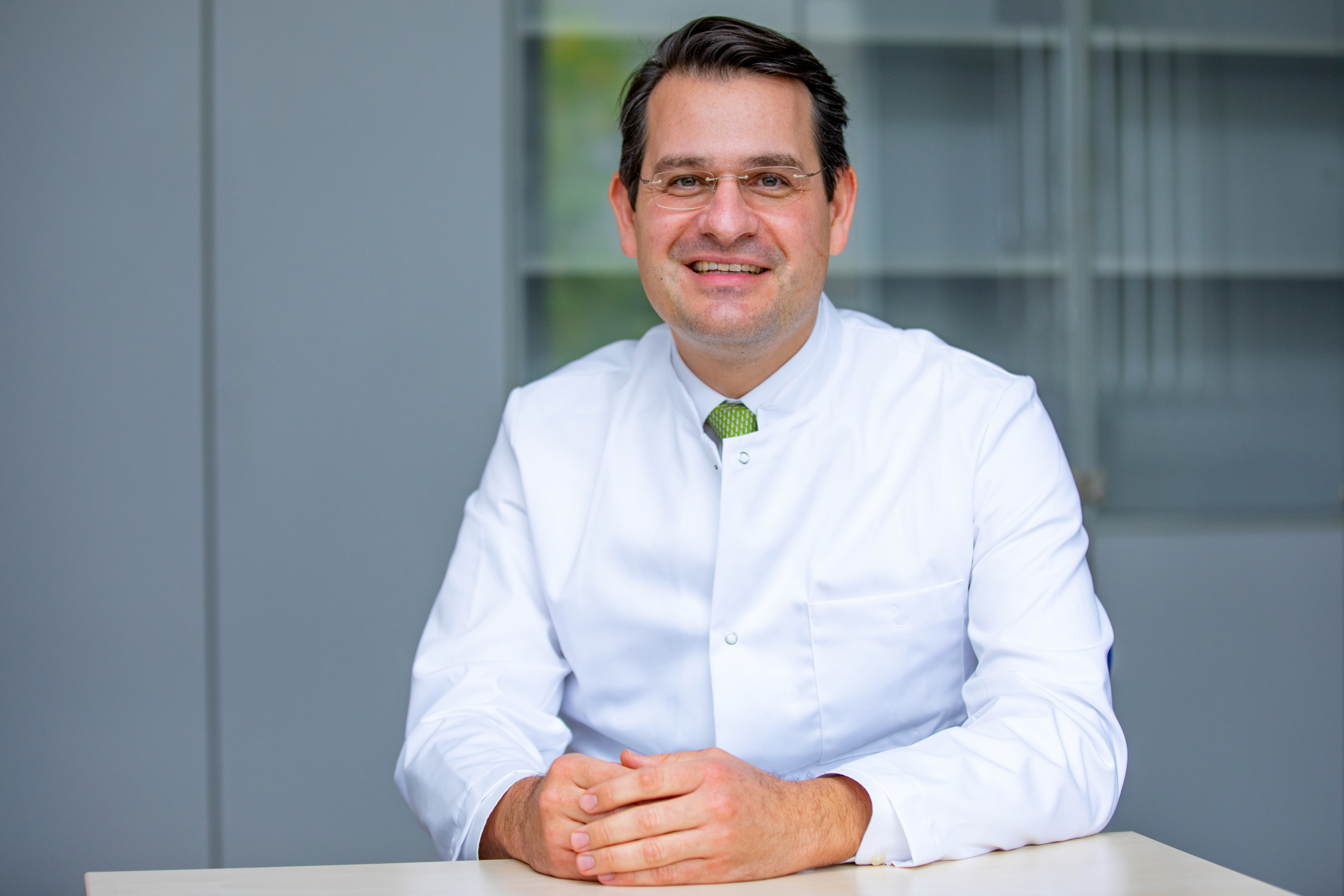Professor Schmelzle is the new head of the MHH Transplant Center

Professor Schmelzle at his desk in his office Copyright: MHH / Karin Kaiser
25.04.2023
Professor Dr. Moritz Schmelzle has headed the Department of General, Visceral and Transplant Surgery at Hannover Medical School since October 1, 2022. On April 1, 2023, he took over from Professor Dr. Axel Haverich as head of the Transplant Center.
The visceral surgeon was previously vice director of the Surgical Clinic at the Charité in Berlin and site director at the Virchow-Klinikum campus. He is a renowned expert in tumor and transplant surgery with particular expertise in laparoscopic and robotic surgery. Scientifically, he is interested in cell transplantation and organ repair. He has done research at Harvard Medical School, USA, among other places.
Five questions for Professor Schmelzle:
Where does the transplant center stand in your view?
With a large number of groundbreaking scientific innovations, the MHH is one of the pioneers of transplantation medicine. Accordingly, transplantation medicine is one of the defining focal points of the MHH in research and patient care. The Transplant Center serves to coordinate all clinics, institutes and outpatient departments involved in transplantation. With more than 300 thoracic and abdominal organs transplanted per year and a large number of translational research projects, this is a great challenge. However, we are very well positioned for this with our organizational structure and experienced staff.
As the new director, the further development of the transplant center is in your hands. What are the first steps?
A generation change is currently taking place at the MHH. I am all the more pleased that all management positions in the clinics and institutes involved in the Transplant Center have now been successfully filled. The task now is to tackle the major challenges in the field of transplant medicine and to jointly develop visions for the future. Of overriding importance for the further development of transplant medicine at the MHH is the close link between research and clinical practice. The task of the MHH Transplant Center will be to provide a forum for exchange and thus to bundle existing potential.
What role does research play at the center?
At the MHH, the translational idea in research is impressively strong, i.e. bringing a finding from the laboratory into patient care. This is so successful at the MHH due to the close integration of institutes and clinics in terms of space and personnel. Our joint focus is currently on even greater interdisciplinarity in transplantation research, on even better linking of the research groups and the topics being researched. Joint initiatives for collaborative research centers, clusters of excellence and other research projects are currently in full swing. I am sure that together we can really make a difference at the MHH.
What about patient care?
With over 15,000 thoracic and abdominal organ transplants performed, the MHH Transplant Center is one of the largest centers in the world. The resulting enormous experience of all involved allows us to perform even the most complex transplants with a high quality of treatment and excellent long-term success. The MHH will continue to live up to its historic role as one of the internationally visible "pacemakers" in the future, I have no worries about that. I am thinking, for example, of the expansion of organ perfusion. It enables us to transplant even marginal organs with good results. In addition, we will increasingly offer living donation, especially for tumor patients, and this will be done more and more gently using the surgical robot.
What is the importance of nursing care?
Nursing care is of central importance for the successful treatment of transplanted patients. In this respect, we at the MHH can consider ourselves fortunate that the important Transplant Nursing Initiative was launched at the MHH in the summer of 2021. This is based on established nursing concepts from the oncology field and, by specializing in the care of transplanted patients, allows us to maintain the very highest standards.
However, the increasing shortage of skilled nursing staff is a cause for concern.
This is of course particularly true in the specialized field of transplant medicine, where we urgently need highly motivated and especially qualified nursing staff.
SERVICE:
For more information, contact Prof. Dr. Moritz Schmelzle, schmelzle.moritz@mh-hannover.de, phone (0511) 532-6534.